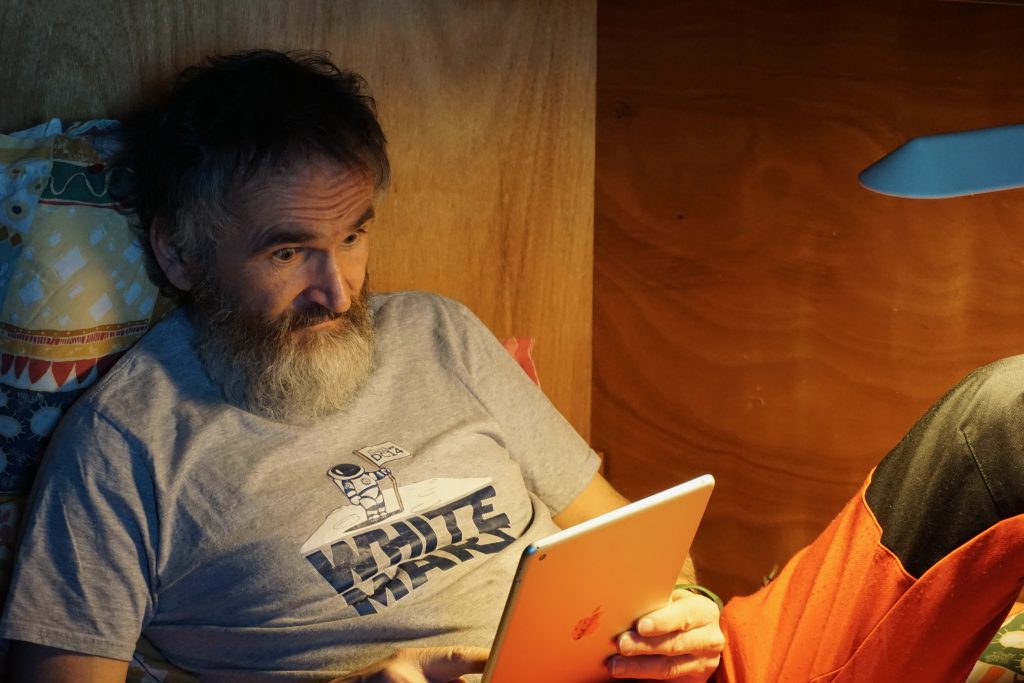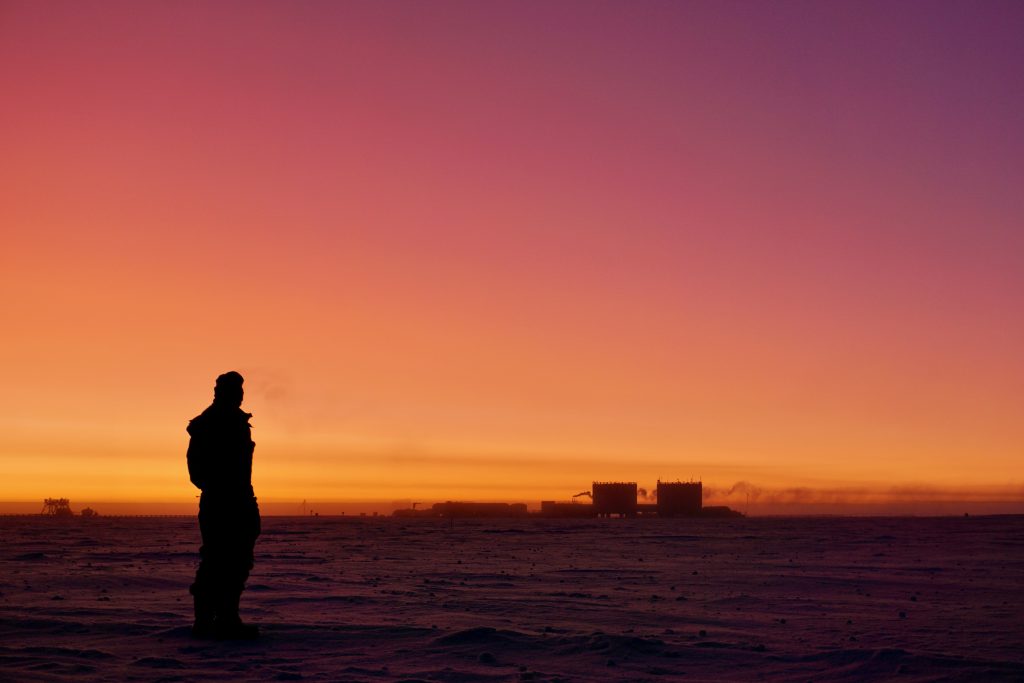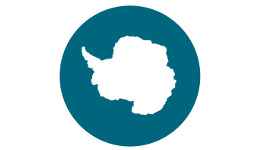Dr. Stijn Thoolen is the ESA-sponsored medical doctor spending 12 months at Concordia research station in Antarctica. He facilitates a number of experiments on the effects of isolation, light deprivation, and extreme temperatures on the human body and mind. Find this blog post in the original Dutch below.
Read part 1 and part 2 and part 3.
But there is more to the ESA lab, and I have saved the best for last. So, now that you are probably overloaded with theories and facts, let’s talk about something very different. Let’s talk about sex!
And before we continue, you have to promise me to turn on another song, to end this blog with some appropriate groove.
So, sex at Concordia… Well, to tell you the truth, there doesn’t seem much to it. At least, I haven’t seen it. Maybe there has been more excitement in other crews, but with my girlfriend on the other side of the globe I couldn’t agree more with the wisdom of Apsley Cherry-Garrard, a member of the famous and ill-fated Terra Nova expedition to the South Pole in 1910-1913:
‘Both sexually and socially the polar explorer must make up his mind to be starved’
But maybe there is more to it than it seems, and what Cherry-Garrard says is not necessarily easy to do. We are human, after all. Sexuality is one of our core features, vital for our existence, and for many it is a fundamental source of pleasure, intimacy, bonding, and social relations. Researchers have shown how sexual deprivation can lead to frustration, anger and even depression, and also seen from a group perspective anecdotal accounts have shown that sexual desire and related feelings of jealousy and competition can lead to adaptation problems in extreme environments. Including Concordia!
But the problem with sex it that we don’t easily talk about it. Perhaps it is so close to our core that opening up about it can make us feel vulnerable. A sensitive topic, and while researchers are currently busy figuring out how to compose future space crews in terms of culture, personality and gender, data about sexual behaviour and its effects on team dynamics in extreme environments is basically non-existent! How do we cope? How, why, and when do we suffer? Recent political debates and scandals of sexual harassment have already highlighted the importance of having a work environment free of sexual hostility, and if you ask me, it would be irresponsible to send humans on a multi-billion dollar long-duration mission to Mars without being able to answer these questions!
As such, the project SWICE (‘sexual well-being and sexual security in isolated, confined and extreme environments’), for the first time in spaceflight research history, is breaking the taboo. As the first study of its kind, it aims to gather basic information about human sexuality while living in isolation and confinement, and it does so by making us in Concordia talk:
‘How often does another Concordia inhabitant asks me for sexual favors?’ (we better forget the jokes at the dinner table…), ‘How often does another Concordia inhabitant produces sexually explicit graffiti for display at Concordia?’ (we better forget the sexually explicit Play-Doh creations we made with the whole crew last month…), ‘How enjoyable is your sexual life right now?’, ‘How often do you masturbate?’, ‘How often do you experience an orgasm?’ (Damn, you want to know everything!).

We had a structured anonymous interview (you know, like in the movies, with voice distortion and stuff) before we came here, and we will repeat it upon our return to Europe. Meanwhile, here in Concordia we fill in questionnaires throughout the year that look much like the above. And to make sure that everyone feels safe and confident to provide such sensitive data, and as I don’t want to know how the others here spend their free time, we all got an iPad to send the data directly to Berlin. This way everything stays anonymous. Still, answering these questions are good for a solid lesson in shamelessness I would say! Everything for a safer, healthier, and more successful environment, and again, for the good cause of science!
And with that I think you have heard enough ESA lab, and enough material to ponder upon. So now you know a little more about the challenges that we face here and what keeps me busy so far from home, I can only encourage you to appreciate the things we sometimes miss here, and enjoy the environment you interact with. Take a deep breath of oxygen-rich air, get yourself dirty every once in a while, find some fresh food, explore the beautiful and ever-changing world around you!

Maar er gebeurt nog meer in het ESA-lab, en ik heb het beste voor het laatst bewaard. Dus, nu je waarschijnlijk overbelast bent met theorieën en feiten, lijkt het me goed om het eens over iets heel anders te hebben. Wat dacht je van seks?
Maar voordat we verder gaan moet je me beloven om nog een nummer af te spelen, om deze blog met gepaste groove af te sluiten.
Dus, seks in Concordia… Nou, om eerlijk te zijn is er niet zoveel aan. Tenminste, ik heb het niet opgemerkt. Misschien is er meer opwinding geweest in vorige bemanningen, maar nu mijn vriendin zich aan de andere kant van de wereld bevindt ben ik het volledig eens met de wijsheid van Apsley Cherry-Garrard, één van de bemanningsleden van de beroemde en noodlottige Terra Nova expeditie naar de zuidpool in 1910-1913:
‘Both sexually and socially the polar explorer must make up his mind to be starved’.
Maar misschien zit er meer achter dan het in eerste instantie lijkt, en wat Cherry-Garrard zegt is nou niet bepaald gemakkelijk. We zijn ten slotte mensen. Seksualiteit is één van onze kerneigenschappen, vitaal voor ons bestaan, en voor velen een fundamentele bron van genot, intimiteit, binding en sociale relaties. Onderzoekers hebben laten zien hoe seksuele deprivatie kan leiden tot frustratie, woede en zelfs depressie, en ook vanuit groepsperspectief gezien blijkt uit anekdotes dat seksueel verlangen en daaraan gerelateerde gevoelens van jaloezie en competitie kunnen leiden tot adaptatieproblemen in extreme omgevingen. Inclusief Concordia!
Maar het probleem met seks is dat we er niet gemakkelijk over praten. Misschien komt het zo dicht bij onze kern dat we ons kwetsbaar voelen wanneer we ons erover openstellen. Een gevoelig onderwerp dus, en terwijl onderzoekers momenteel druk bezig zijn om uit te vogelen hoe de toekomstige ruimtevaartbemanning op gebied van cultuur, personaliteit en geslacht er uit moet komen te zien, ontbreekt vooralsnog iedere vorm van data over seksueel gedrag en het effect daarvan op groepsdynamiek in zulke extreme omstandigheden! Hoe gaan we er mee om? Hoe, waarom, en wanneer lijden we eronder? Recente discussies in de politiek en seksschandalen hebben al duidelijk gemaakt hoe belangrijk het is om een werkomgeving vrij van seksuele agressie te hebben, en als je het mij vraagt is het onverantwoord om mensen op een langdurige miljarden-missie naar Mars te sturen zonder eerst deze vragen te kunnen beantwoorden!
Het project SWICE (‘sexual wellbeing and sexual security in isolated, confined and extreme environments’), voor de eerste keer in de geschiedenis van het ruimtevaartonderzoek, breekt daarom het taboe. Een unieke studie, waarmee wordt geprobeerd om basale informatie te verzamelen over menselijke seksualiteit in omstandigheden van isolatie en opsluiting, en wel door ons in Concordia te laten praten:
‘Hoe vaak vraagt een andere Concordiabewoner mij om een seksuele dienst?’ (laten we de grapjes aan de dinertafel maar vergeten…), ‘Hoe vaak vertoont een andere Concordiabewoner seksueel getinte graffiti in Concordia?’ (laten we de seksueel getinte klei-creaties die we afgelopen maand met zijn allen gemaakt hadden ook maar vergeten…), ‘Hoe plezierig is je seksuele leven op het moment?’, ‘Hoe vaak masturbeer je?’, ‘Hoe vaak ervaar je een orgasme?’ (Jemig, jullie willen ook alles weten!).
We hadden een gestructureerd anoniem interview (je weet wel, zoals in de films, met stemvervorming en al) voordat we hier kwamen, en we doen dat nog eens wanneer we weer terug in Europa zijn. Intussen vullen we hier in Concordia gedurende het jaar vragenlijsten in die veel weg hebben van bovenstaande. En om er zeker van te zijn dat iedereen zich veilig en zelfverzekerd genoeg voelt om de onderzoekers van zulke gevoelige data te voorzien, en omdat ik helemaal niet wil weten hoe iedereen hier zijn vrije tijd besteed, hebben we allemaal een iPad gekregen om de data direct naar Berlijn te sturen. Zo blijft alles anoniem. En dan nog brengt het beantwoorden van dit soort vragen een stevige les schaamteloosheid met zich mee! Allemaal voor een veiligere, gezondere, en succesvollere omgeving, en nogmaals, voor de goede zaak van de wetenschap!
En daarmee denk ik dat je wel genoeg gezien hebt van het ESA-lab, en genoeg materiaal om eens goed over na te denken. Nu je een beetje meer weet over de uitdagingen waarmee we hier te maken hebben en waarmee ik me zo ver van huis mee bezig houd, kan ik je alleen maar aanmoedigen om de dingen te waarderen die we hier soms missen, en te genieten van de omgeving waar je zoveel mee te maken hebt. Neem een diepe teug zuurstof, word af en toe eens een keer goed vies, vind wat vers voer, ontdek de prachtige en altijd-veranderende wereld om je heen!




Discussion: 3 comments
Dear Sirs,
Sorry for inconvenience, we would kindly to ask a limited question in respect to the qualify Mars to be able to support life,
Which choice is more acceptable for a long term?
Installation of human foundations on Mars in closed pressure vessels.
Or
Using a nuclear explosions to fail the two moons Mars (Phobos and Deimos) to increase the value of the gravity force of Mars to increase the value of the pressure of the atmosphere of Mars.
We do understand the international agreements in respect to prohibited using a nuclear weapons in space, but remember the is an old deal since 1969, while everything are in progress, therefore this issue should also be reviewed again to make a new international agreement.
In the meantime we would draw your attention that the traditional explosions may be a much more affective then the nuclear explosions, due to the absence of gases in the space around those two moons according to the thermodynamic laws for compressible fluids P*V=N*R*T therefore we may only need to make a merely a traditional explosions in respect to reduce the value of the rushing speeds of two moons of Mars.
We are not focusing upon accepting my application to get some prises, but this is a unique opportunity to talk about this with a specialist of ESA, again please accept my apologies to disturbing you via my discussion but remember we would kindly to solve the issue of installation of human foundations on Mars successfully, thank you for this opportunity to let us to talk to you in respect to this issue while we would kindly ask you to keep our suggestions in the consideration for a long term plans.
Good luck.
Dr. Thoolen,
Thank you for such an interesting blog post! I am a sociology PhD student at University of Iowa, and my dissertation touches on emotional well being and gender in isolated confined extreme environments (I use data from Mars Desert Research Station). I would love to know more about SWICE project. Would it be possible to get in touch with the research team? I have a lot of questions to ask both about data collection and research questions.
Take care!
Inga Popovaite
Dear Dr Smith
I am ex ESA a fellow of the BIS and a member of its E&O committee.
The BIS is lauching a simposium on the 12th of April titled Beyond the Moon info at https://www.bis-space.com/event/beyond-the-moon/ and we think that a presentaiton paper form Concordia would be very appropriate The contact poiint of the person organsing the event is on the website The event is online due to Covid
I hope you may be able to contribute and tell the event participants what its like to live in isolation as a team with considerations about the fact that the first flight to Mars will provide the astronauts with less space rthen what you have at Concordia Look forward hearing from you Best regards
Marino